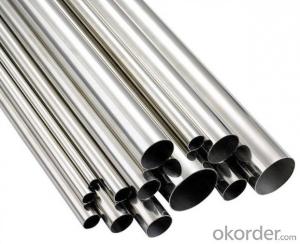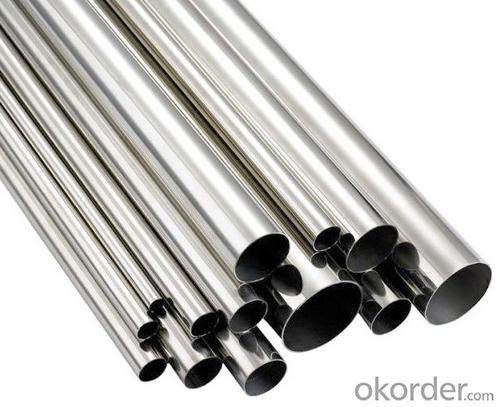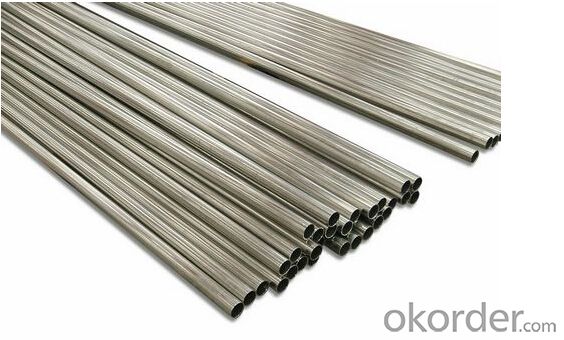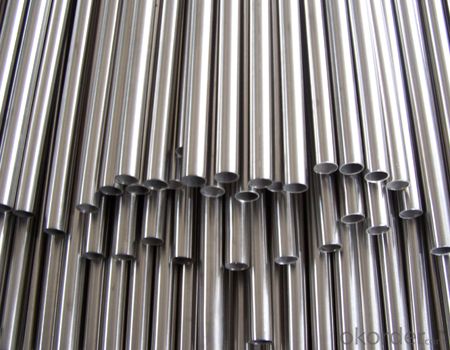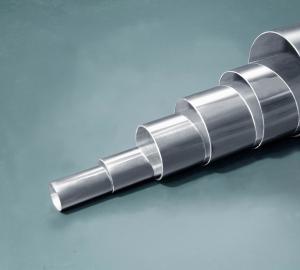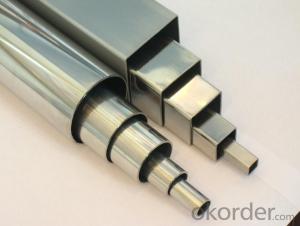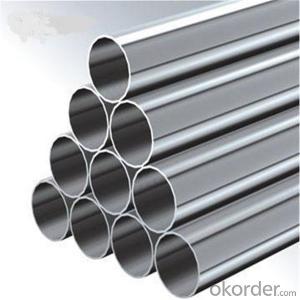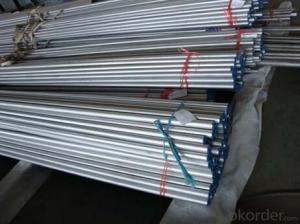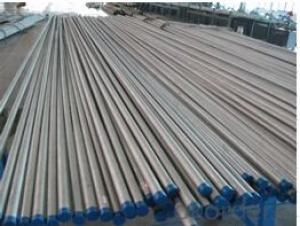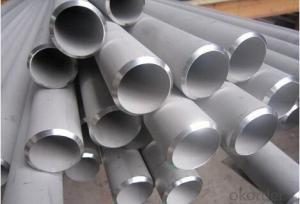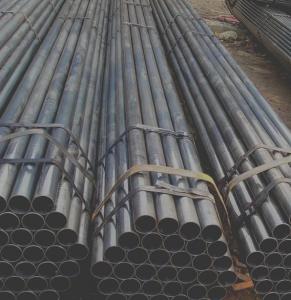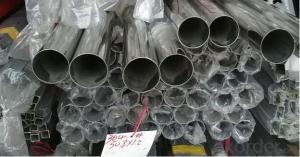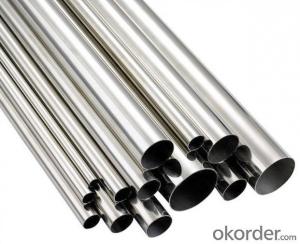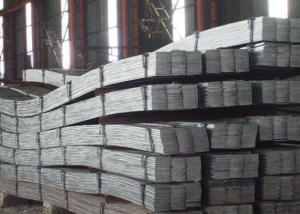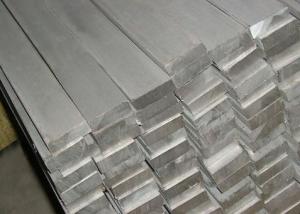Boiler Heat Exchanger Stainless Steel Pipe 2507 ASTM A213
- Loading Port:
- Ningbo
- Payment Terms:
- TT or LC
- Min Order Qty:
- 30 m.t.
- Supply Capability:
- 12000 m.t./month
OKorder Service Pledge
OKorder Financial Service
You Might Also Like
1、Structure of Boiler Heat Exchange stainless steel pipe 2507 ASTM A213 Description:
Boiler Heat Exchange stainless steel pipe is often used in the heating system. Heating system, or those stored energy (such as solar energy) in the form of heat, need to be built with the material that can withstand temperatures up to 550 degrees Celsius. High chromium molybdenum welded steel pipe can work in the extreme, which maintain as the ideal material for the construction of power station.
2、Main Features of Boiler Heat Exchange stainless steel pipe 2507 ASTM A213:
• High manufacturing accuracy
• High strength
• Small inertia resistance
• Strong heat dissipation ability
• Good visual effect
•Reasonable price
3、Boiler Heat Exchange stainless steel pipe 2507 ASTM A213 Specification:
1)Commodity: heat exchanger pipe
2))Material: 304,316L,304L,316,321,310S,etc
3)Thickness:0.5-100mm
4)Length: 1-14m
4、FAQ of Boiler Heat Exchange stainless steel pipe 2507 ASTM A213:
①How is the quality of your products?
Our products are manufactured strictly according to national and internaional standard, and we take a test on every pipe before delivered out. If you want see our quality certifications and all kinds of testing report, please just ask us for it.
Guaranteed: If products’ quality don’t accord to discription as we give or the promise before you place order, we promise 100% refund.
②How about price?
Yes, we are factory and be able to give you lowest price below market one, and we have a policy that “ for saving time and absolutely honest business attitude, we quote as lowest as possible for any customer, and discount can be given according to quantity”,if you like bargain and factory price is not low enough as you think, just don’t waste your time.Please trust the quotation we would give you, it is professional one.
③Why should you chose us?
Chose happens because of quality, then price, We can give you both.Additionally, we can also offer professional products inquiry, products knowledge train(for agents), smooth goods delivery, exellent customer solution proposals.Our service formula: good quality+good price+good service=customer’s trust
SGS test is available, customer inspection before shipping is welcome, third party inspection is no problem.
Any question, pls feel free to contact us !
5、Boiler Heat Exchange stainless steel pipe 2507 ASTM A213 Images:
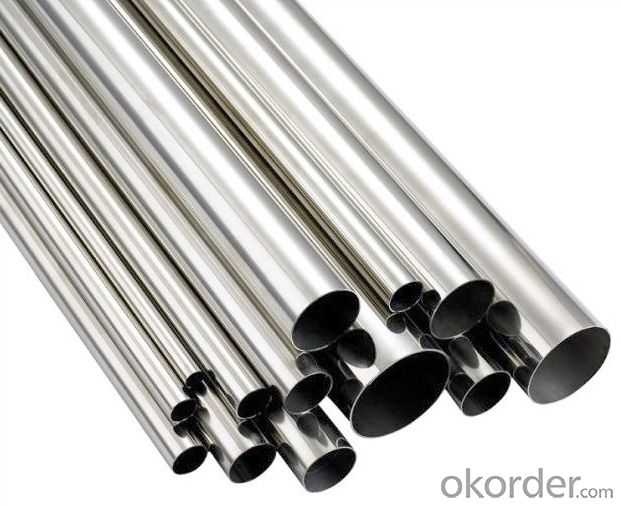
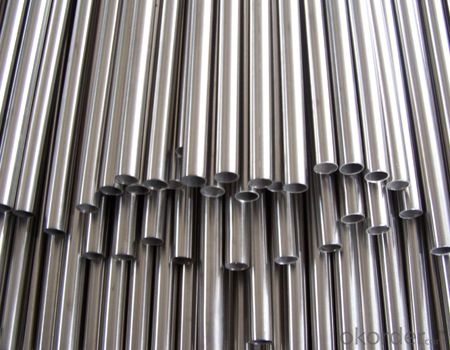
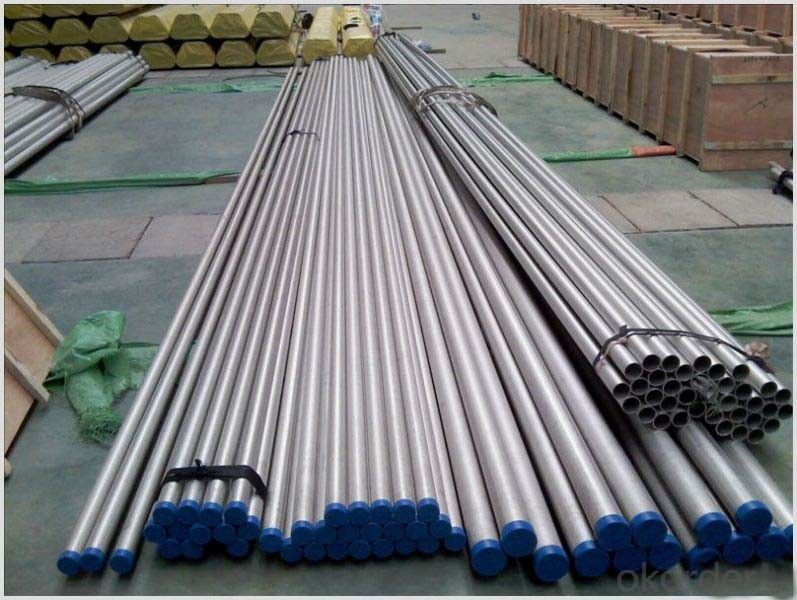
- Q: Are stainless steel pipes suitable for high-temperature environments?
- Yes, stainless steel pipes are suitable for high-temperature environments. Stainless steel is known for its excellent heat resistance properties, making it a popular choice for use in high-temperature applications. It can withstand temperatures ranging from sub-zero to extremely high levels without losing its mechanical properties. This makes stainless steel pipes ideal for industries such as oil and gas, chemical processing, and power generation, where high temperatures are common. Additionally, stainless steel pipes have excellent corrosion resistance, which further enhances their suitability for high-temperature environments.
- Q: What are the advantages of using stainless steel pipes in the oil and gas industry?
- There are several advantages of using stainless steel pipes in the oil and gas industry. 1. Corrosion resistance: Stainless steel pipes are highly resistant to corrosion, making them ideal for transporting oil and gas. They can withstand extreme temperatures, harsh chemicals, and corrosive environments, ensuring long-term durability and preventing costly repairs or replacements. 2. Strength and durability: Stainless steel pipes have high tensile strength, which means they can withstand heavy loads and high-pressure environments. This characteristic makes them suitable for transporting oil and gas over long distances, as they can handle the required stress without compromising their structural integrity. 3. Hygienic and clean: Stainless steel pipes are non-porous and have a smooth surface, making them resistant to bacterial growth and minimizing the risk of contamination. This is crucial in the oil and gas industry, where maintaining the purity and quality of the transported fluids is paramount. 4. Heat resistance: Stainless steel pipes can handle high temperatures without deformation or degradation. They are capable of withstanding the extreme heat generated during the extraction, refining, and transportation processes in the oil and gas industry. 5. Flexibility and adaptability: Stainless steel pipes can be easily modified or customized to meet specific requirements. They can be welded, bent, or shaped into various configurations without compromising their strength or integrity. This flexibility allows for efficient installation and reduces the need for additional connectors or fittings. 6. Longevity and cost-effectiveness: Stainless steel pipes have a long lifespan, often exceeding 50 years, when properly maintained. This longevity reduces the frequency of replacements and repairs, minimizing downtime and overall costs in the oil and gas industry. 7. Environmental sustainability: Stainless steel is a highly recyclable material, making it an environmentally friendly choice. When stainless steel pipes reach the end of their life cycle, they can be easily recycled and used to manufacture new products, reducing waste and conserving resources. In summary, the advantages of using stainless steel pipes in the oil and gas industry include corrosion resistance, strength and durability, hygienic and clean properties, heat resistance, flexibility and adaptability, longevity and cost-effectiveness, as well as environmental sustainability. These benefits make stainless steel pipes a reliable and efficient choice for transporting oil and gas, ensuring the integrity and safety of the operations.
- Q: How do you calculate the pressure drop in stainless steel pipes?
- In order to determine the pressure drop in stainless steel pipes, one must take into account various factors including the flow rate, pipe diameter, pipe length, and the properties of the fluid being transported. The pressure drop can be calculated using the commonly used Darcy-Weisbach equation, which is as follows: ΔP = (f * (L/D) * (ρ * V^2))/2 Where: ΔP represents the pressure drop (in units of force per unit area, such as psi or Pa) f is the Darcy friction factor (which depends on flow conditions and pipe roughness) L represents the pipe length (in units of length, such as meters or feet) D is the pipe diameter (in units of length, such as meters or feet) ρ corresponds to fluid density (in units of mass per unit volume, such as kg/m^3 or lb/ft^3) V represents fluid velocity (in units of length per unit time, such as m/s or ft/s) To calculate the pressure drop, one must determine the Darcy friction factor, which is dependent on the Reynolds number (Re) and the relative roughness of the pipe. The Reynolds number can be calculated using the following equation: Re = (ρ * V * D)/μ Where: μ represents fluid viscosity (in units of force per unit area per unit time, such as Pa·s or lb/ft·s) Once the Reynolds number has been determined, empirical correlations or Moody's chart can be used to find the Darcy friction factor for the given flow conditions. With the friction factor, pipe length, diameter, fluid density, and velocity, the pressure drop can then be calculated using the Darcy-Weisbach equation. It is important to note that the aforementioned equations provide an approximate calculation of pressure drop in stainless steel pipes. The accuracy of the calculation may be influenced by factors such as pipe roughness, fluid properties, and the flow regime. It is also recommended to consult relevant standards or engineering references for more detailed and accurate calculations.
- Q: What is the difference between seamless and ERW stainless steel pipes?
- Seamless stainless steel pipes are made by extruding a solid billet through a piercing rod to create a hollow tube, while ERW (Electric Resistance Welded) stainless steel pipes are formed by rolling a strip of steel into a tube and then welding the edges together using an electric current. The main difference is the manufacturing process, with seamless pipes having no welded seams, making them stronger and more suitable for high-pressure and high-temperature applications. On the other hand, ERW pipes are more cost-effective and commonly used for lower-pressure applications.
- Q: Are stainless steel pipes suitable for semiconductor industries?
- Stainless steel pipes are ideal for use in semiconductor industries. They possess excellent qualities that make them widely used in various sectors, including semiconductor manufacturing. The primary reason why stainless steel pipes are suitable for the semiconductor industry is their remarkable resistance to corrosion. Given that the semiconductor manufacturing process involves the usage of corrosive chemicals and gases, stainless steel pipes can endure the harsh conditions and remain intact for extended periods. Moreover, stainless steel pipes exhibit exceptional mechanical properties, such as high strength and durability. These attributes are crucial in semiconductor industries where the pipes must withstand both high pressure and temperature conditions. Stainless steel pipes can endure these demanding circumstances without warping or breaking, ensuring the safety and efficiency of the semiconductor manufacturing process. Additionally, stainless steel pipes possess excellent cleanliness and hygienic properties, making them highly favored in semiconductor industries. Maintaining cleanliness is of utmost importance in these sectors to prevent contamination. Stainless steel pipes have a smooth surface that prevents the accumulation of particles, making them easy to clean and sterilize. Lastly, stainless steel pipes possess excellent thermal conductivity, which is vital in semiconductor industries that require precise temperature control. These pipes efficiently transfer heat, ensuring stable and accurate temperature regulation during various manufacturing processes. To summarize, stainless steel pipes are highly suitable for semiconductor industries due to their resistance to corrosion, mechanical properties, cleanliness, and thermal conductivity. They offer dependable and efficient performance, making them the preferred choice for the demanding requirements of semiconductor manufacturing.
- Q: What is the cost of stainless steel pipes?
- The cost of stainless steel pipes can vary based on factors such as the size, grade, and quantity needed. It is best to contact a supplier or manufacturer for specific pricing information.
- Q: Can stainless steel pipes be used for natural gas?
- Yes, stainless steel pipes can be used for natural gas. Stainless steel is highly resistant to corrosion and can withstand the high pressures and temperatures associated with natural gas transmission and distribution. Additionally, stainless steel pipes have excellent fire resistance properties, making them a safe choice for natural gas applications.
- Q: What's the difference between stainless steel seamless tube and stainless steel welded pipe?
- Stainless steel welded pipe is also a hollow section of steel, but it is welded through the plate into the steel pipe, so there is a welded steel pipe welding gap.
- Q: Are stainless steel pipes suitable for extreme temperatures?
- Yes, stainless steel pipes are suitable for extreme temperatures. Stainless steel is known for its high temperature resistance and ability to withstand both low and high temperatures without losing its structural integrity or mechanical properties. It can handle extreme heat and cold, making it a reliable choice for various industrial applications, including those involving extreme temperature environments.
Send your message to us
Boiler Heat Exchanger Stainless Steel Pipe 2507 ASTM A213
- Loading Port:
- Ningbo
- Payment Terms:
- TT or LC
- Min Order Qty:
- 30 m.t.
- Supply Capability:
- 12000 m.t./month
OKorder Service Pledge
OKorder Financial Service
Similar products
Hot products
Hot Searches
Related keywords
